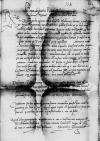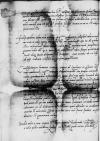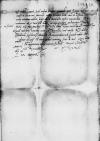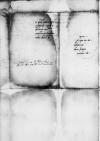Habuimus ⌊⌋ S(trenuitatis) or S(inceritatis)⌈S(trenuitatis)S(trenuitatis) or S(inceritatis)⌉ Tuae datas ex ⌊Bruxellis⌋ 1531-10-02⌊secunda mensis Octobris1531-10-02⌋, quibus scribit se ex litteris magnifici ⌊Ludovici Aliphii⌋, secretarii et oratoris regii ac nostri, intellexisse, quod negotium nostrum ⌊Montis Serici⌋, tametsi tractari coeptum sit, officiales tamen ⌊Regni Neapolitani⌋ aliis ⌊caesaris⌋ negotiis se excusant, dicentes se nihil in eo negotio facere posse sine ⌊prorege⌋, quem exspectant. Miramur, unde ea varietas scriptionis oborta sit, nobis siquidem scripserat antea finem huius negotii nostri iam tandem sine omni mora futurum, cuius rei causa ⌊Neapolim⌋ se iturum aiebat. Scribimus nunc illi, ut, quid in causa sit, nos e vestigio reddat certiores et causam velis remisque ad portum optatum traducere contendat, et forsan in hanc diem aliquid boni confectum est. Gratum autem nobis est, quod S(trenuitas) or S(inceritas)⌈S(trenuitas)S(trenuitas) or S(inceritas)⌉ Tua litteras a ⌊caesarea maiestate⌋ obtinere satagat ad ⌊concilium collaterale⌋, ut hoc negotium absolvant. Eas expeditas mittat S(trenuitas) or S(inceritas)⌈S(trenuitas)S(trenuitas) or S(inceritas)⌉ Tua, sicut pollicetur etc.
Dohanam et illas summas rebellium nunc missa facimus, licet de iis antehac nobis S(trenuitas) or S(inceritas)⌈S(trenuitas)S(trenuitas) or S(inceritas)⌉ Tua meliorem, quam nunc, spem dederat. ⌊Montem Sericum⌋ primum nobis redintegrari obtineat, deinde dohanae et summarum rebellium pro industria sua curam habebit, aut unius horum duorum.
⌊Carducium⌋ forsan penuria expensarum ⌊Neapolim⌋ profectum esse cognovimus ex litteris S(trenuitatis) or S(inceritatis)⌈S(trenuitatis)S(trenuitatis) or S(inceritatis)⌉ Tuae. Quid agat ⌊Scipio⌋ et quomodo res suas confecerit, quandoque abierit, significet nobis S(trenuitas) or S(inceritas)⌈S(trenuitas)S(trenuitas) or S(inceritas)⌉ Tua, ut solet.
Quod alios sexingentos ducatos auri S(trenuitas) or S(inceritas)⌈S(trenuitas)S(trenuitas) or S(inceritas)⌉ Tua a ⌊Velseris⌋ non acceperit, non illibenter audimus, nec enim omnino licuisset, neque id umquam de Tua S(trenuitate) or S(inceritate)⌈S(trenuitate)S(trenuitate) or S(inceritate)⌉ certo nobis pollicebamur. Hos autem sexingentos,  BCz, 3465, p. 208, quos ex gratia nostra pro Tua S(trenuita)te or S(incerita)te⌈S(trenuita)teS(trenuita)te or S(incerita)te⌉ ⌊Velseris⌋ nos soluturas submisimus, scribit nobis magnificus ⌊Ludovicus Aliphius⌋, scribit etiam et ⌊thesaurarius noster⌋, iam solutos esse, quod etsi ita factum esse, nihil addubitemus, cum isti nobis non nisi vera, uti par est, scribere soleant, tamen ea in re et adhuc scribemus illis.
BCz, 3465, p. 208, quos ex gratia nostra pro Tua S(trenuita)te or S(incerita)te⌈S(trenuita)teS(trenuita)te or S(incerita)te⌉ ⌊Velseris⌋ nos soluturas submisimus, scribit nobis magnificus ⌊Ludovicus Aliphius⌋, scribit etiam et ⌊thesaurarius noster⌋, iam solutos esse, quod etsi ita factum esse, nihil addubitemus, cum isti nobis non nisi vera, uti par est, scribere soleant, tamen ea in re et adhuc scribemus illis.
Falso quidam rebus nostris infesti magnificum ⌊Ludovicum Aliphium⌋ calumniantur, non enim is adeo ingenii imbecillis est vel petulantis, qui ea, de quibus illum insimulant, facere debeat. Talis numquam cognitus erat. Propterea gratum nobis est, quod S(trenuitas) or S(inceritas)⌈S(trenuitas)S(trenuitas) or S(inceritas)⌉ Tua illum excusaverit. Idem semper, quotiens opus fuerit, ubique faciat, diligentissime hortamur. Nos autem de iis omnibus ab ipso ⌊Ludovico Aliphio⌋ responsum exspectamus.
Confiscationem bonorum ⌊Nicolai Maria de Lambertis⌋, in crimine laesae maiestatis condemnati, magnificus ⌊Ludovicus Aliphius⌋ impedit non propter commodum nostrum, quandoquidem restituta inde uxori dote, vix nobis trecenti ducati cedere possent, bona enim universa vix ad duorum milium summam ascendunt. Sed agitur de immunitate privilegiorum nostrorum, in quorum pacifica possessione et usufructu tam illustrissima bonae memoriae ⌊mater⌋ nostra, quam nos hucusque fuimus, quae si in hoc minimo infringerentur (quod absit), in similibus et maioribus postea non observarentur, quod quam infelix et iniquum foret, nemo est, qui non videat. Quare S(trenuitatem) or S(inceritatem)⌈S(trenuitatem)S(trenuitatem) or S(inceritatem)⌉ Tuam hortamur, ut modis omnibus adnitatur, ne id deducatur in effectum, quod officiales, ut credimus, sine scientia et voluntate ⌊caesaris⌋ adversum iura nostra facere student in praeiudicium et ignominiam nostram.
Scribit nobis S(trenuitas) or S(inceritas)⌈S(trenuitas)S(trenuitas) or S(inceritas)⌉ Tua cupere illustrem dominum ⌊Ferdinandum Gonzaga⌋ a nobis pelles sabellinas habere. Misissemus grato animo plura, quam  BCz, 3465, p. 209 ⌊ipse⌋ postulasset, sed nescit S(trenuitas) or S(inceritas)⌈S(trenuitas)S(trenuitas) or S(inceritas)⌉ Tua, quomodo ipse se erga nos gesserit in ⌊Statu nostro Barensi⌋ nuper tempore belli, non ut affinis, sed velut inimicus noster. Longe aliud coniunctio nostra requirebat. Et hoc volumus, ut S(trenuitas) or S(inceritas)⌈S(trenuitas)S(trenuitas) or S(inceritas)⌉ Tua illi dicat, ne nos ignorare arbitretur. ⌊Eius⌋ tamen fratri, domino ⌊duci Mantuae⌋, et matri ac sorori on the margin⌈ac sororiac sorori on the margin⌉ misimus antea libenter superinscribed⌈libenterlibenter superinscribed⌉ equos, sabellos et armelos etc.
BCz, 3465, p. 209 ⌊ipse⌋ postulasset, sed nescit S(trenuitas) or S(inceritas)⌈S(trenuitas)S(trenuitas) or S(inceritas)⌉ Tua, quomodo ipse se erga nos gesserit in ⌊Statu nostro Barensi⌋ nuper tempore belli, non ut affinis, sed velut inimicus noster. Longe aliud coniunctio nostra requirebat. Et hoc volumus, ut S(trenuitas) or S(inceritas)⌈S(trenuitas)S(trenuitas) or S(inceritas)⌉ Tua illi dicat, ne nos ignorare arbitretur. ⌊Eius⌋ tamen fratri, domino ⌊duci Mantuae⌋, et matri ac sorori on the margin⌈ac sororiac sorori on the margin⌉ misimus antea libenter superinscribed⌈libenterlibenter superinscribed⌉ equos, sabellos et armelos etc.
Quod nobilem iuvenem ⌊Nicolaum Myszcowski⌋ nostra causa reverendissimo domino ⌊cardinali Leodiensi⌋ dederit et commendaverit, gratum nobis est. Mer paper damaged⌈[Mer]Mer paper damaged⌉ebitur id ipse et cum patre amicisque suis S(trenuitati) or S(inceritati)⌈S(trenuitati)S(trenuitati) or S(inceritati)⌉ Tuae.
Quae bene valeat paper damaged⌈[valeat]valeat paper damaged⌉ et negotiorum nostrorum curam habeat.
 BCz, 3465, p. 208, quos ex gratia nostra pro Tua S(trenuita)te or S(incerita)te⌈S(trenuita)teS(trenuita)te or S(incerita)te⌉
BCz, 3465, p. 208, quos ex gratia nostra pro Tua S(trenuita)te or S(incerita)te⌈S(trenuita)teS(trenuita)te or S(incerita)te⌉  BCz, 3465, p. 209
BCz, 3465, p. 209 


